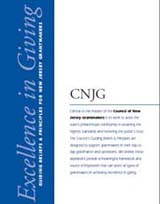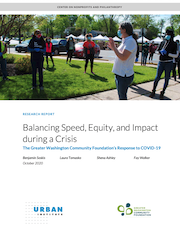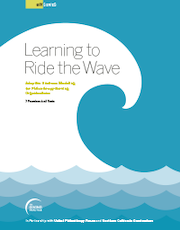Site Search
- resource provided by the Forum Network Knowledgebase.
Search Tip: Search with " " to find exact matches.

This includes insights and tips related to board governance, legal compliance, grantee communications, fiscal responsibility, public disclosure, and many other key areas of foundation governance and operations. It is intended to serve as a practical resource to assist foundations in their grantmaking.
Grantmaking at the Crossroads is a workbook designed to provide foundations with a new grantmaking methodology that works at the intersection of place, population, and issue. It offers a pathway to greater inclusion of communities that are often excluded or marginalized by foundation funding and enables foundations to maintain their focus and priorities while expanding their reach and effectiveness.
The Grand Rapids Community Foundation and the Kalamazoo Community Foundation volunteered to be laboratories for Grantmaking at the Crossroads and have been critical informants for this workbook. Each of these foundations holds an unwavering commitment to ongoing learning; this publication would not have happened without their support and engagement and the financial support of the Arcus Foundation.
This report highlights three philanthropic efforts to build the capacity of local communities in the West - The Ford Family Foundation’s Ford Institute Leadership Program, the Northwest Area Foundation’s Horizons Program, and the Orton Family Foundation’s Heart and Soul Community Planning Program.
Sample disaster preparedness and recovery plans for foundations.
- attribute the materials to the Council of New Jersey Grantmakers
- affix references to the Council of New Jersey Grantmakers on all reproductions
- make no changes to the materials
- refrain from any redistribution of the materials
- Uploading, posting, emailing, transmitting or otherwise making available any content that is unlawful, harmful, threatening, abusive, libelous, or obscene;
- Impersonating any person or entity, or falsely stating or otherwise misrepresenting your affiliation with a person or entity;
- Forging headers or otherwise manipulating identifiers in a manner that disguises the origin of any content you transmit in any manner through this Web site;
- Uploading, posting, emailing, transmitting or otherwise making available any content that you do not have a right to make available under any law or under any contractual or fiduciary relationship (such as inside information, proprietary and confidential information learned or disclosed as part of employment relationships or under nondisclosure agreements);
- Uploading, posting, emailing, transmitting or otherwise making available any content that infringes any patent, trademark, trade secret, copyright or other proprietary right of any party;
- Uploading, posting, emailing, transmitting or otherwise making available any unsolicited or unauthorized advertising, promotional materials, or any other form of solicitation, without the Forum’s prior written approval;
- Uploading, posting, emailing, transmitting or otherwise making available any content or material that contains software viruses, worms or any other computer code, files or programs designed to interrupt, destroy or limit the functionality of any computer software or hardware or telecommunications or other equipment, or to cause a security breach of such software, hardware or telecommunications or other equipment;
- Interfering with or disrupting any servers or networks used to provide this Web site, or disobeying any requirements, procedures, policies or regulations of the networks we use to provide this site;
- Violating any applicable local, state, national or international law, including, but not limited to (i) all applicable laws regarding the transmission of technical data exported from the United States or the country in which you reside, (ii) regulations promulgated by the U.S. Securities and Exchange Commission, and (iii) any rules of any national or other securities exchange, including, without limitation, the New York Stock Exchange, the American Stock Exchange or the NASDAQ;
- “Stalking” or otherwise harassing another;
- Instigating or encouraging others to commit illegal activities or cause injury or property damage to any person;
- Collecting or storing personal data about other users;
- Gaining unauthorized access to our web site, or any account, computer system, or network connected to this web site, by means such as hacking, password mining or other illicit means; or
- Obtaining or attempting to obtain any materials or information through any means not intentionally made available through this Web site.

The COVID-19 public health and economic crisis has changed our world as we know it. As employers moved to remote work, schools shifted to distance learning, and businesses closed completely, it became clear that the impact on residents, nonprofits, and businesses was far greater than anyone could have ever imagined.
In response to the growing and evolving needs of our region, the Greater Washington Community Foundation established the COVID-19 Emergency Response Fund to raise and rapidly deploy funding to local nonprofits providing food, shelter, educational supports, and other critical services.
From the beginning our goal was clear: to address the immediate needs and reach adversely affected communities, particularly low-income households and communities of color. We know all too well that in a crisis like this, these marginalized communities are hit the hardest, and often take the longest to recover.
In times of crises, The Community Foundation is our region’s philanthropic first responder, bringing together individuals and families, philanthropic peers, corporate partners, and local government advisors to address community issues. Building on our rich history of emergency response work, we grounded our COVID-19 response efforts in a similar coordinated approach.
This report chronicles the steps taken, under immense pressure, to develop a coordinated emergency response effort to support a broad range of needs across the region. Once again this effort has demonstrated that working in partnership and close collaboration with our philanthropic peers and local government advisors is an effective way to manage a response to both urgent and longer-term needs.
This case study of the Council of Michigan Foundations' Peer Action Learning Network (PALN) is one of six examined in a report from New York University's Wagner Research Center for Leadership in Action, commissioned by Grantmakers for Effective Organizations. The PALN case study, along with the other five, explores the power of learning communities to build connections and knowledge to increase organizations’ community impact. It explains ways grantmakers can strategically support these efforts as well as key elements for designing learning communities, executing for success and extending the learning.

Developed in partnership with United Philanthropy Forum and Northern California Grantmakers, this guide shares seven practices and 12 tools for Philanthropy-Serving Organizations who seek effective ways to mobilize resources to sustain their organization’s work. The guide features perspectives from dozens of leaders of national and regional PSOs and examples from our work with these organizations. Much of the content is based on conversations and strategy work with PSO leaders, staff and board members.
The Ford Institute for Community Building, a program of The Ford Family Foundation, works to help community leaders learn how to implement local solutions based on principles of effective community building. This paper describes the development and work of the The Ford Institute for Community Building.
This paper explores community democracy as a cultural choice and a potential organizing system for philanthropy using stories that demonstrate its principles and practices, primarily growing from the experience of northern California communities. This experience offers a framework of principles and a beginning set of conclusions about how philanthropy can develop productive partnerships from the perspective of a place-based, community democracy.
